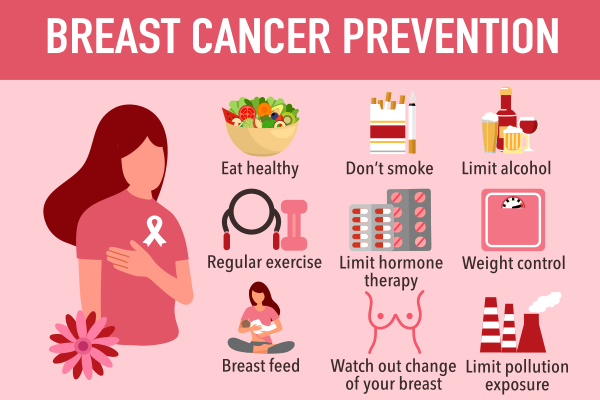
Emerging victorious from breast cancer is a life-changing milestone, but for many survivors, the journey doesn't end there. Breast cancer recurrence remains a concern, even years after treatment. Being informed empowers you to recognise the signs, manage risks, and take proactive steps toward your long-term health.
This blog explains the types, risk factors, symptoms, prevention strategies, and follow-up care associated with breast cancer recurrence, and how Manipal Hospitals Dwarka supports survivors at every step.
Synopsis
- What is Breast Cancer Recurrence?
- Types of Breast Cancer Recurrence
- Risk Factors for Breast Cancer Recurrence
- Signs and Symptoms to Watch Out For
- How to Reduce the Risk of Breast Cancer Recurrence
- Importance of Surveillance and Follow-Up
- How Manipal Hospitals Dwarka Supports Breast Cancer Survivors
- Nutrition and Breast Cancer Recurrence
- Conclusion
What is Breast Cancer Recurrence?
Breast cancer recurrence refers to the return of breast cancer after treatment and a period of remission. It can happen months or even years after initial treatment. Unlike a new cancer diagnosis, recurrence involves the same cancer cells returning in or around the original location—or spreading to other parts of the body.
Types of Breast Cancer Recurrence
There are three major types of recurrence:
|
Type of Recurrence |
Description |
Common Signs |
|
Local Recurrence |
Returns in the same breast or chest wall |
Lump, skin changes, scar tenderness |
|
Regional Recurrence |
Affects nearby lymph nodes (e.g., underarm, neck, collarbone) |
Swelling, a new lump, and pain in those areas |
|
Distant Recurrence |
Cancer spreads to organs like the lungs, liver, bones, and brain |
Bone pain, weight loss, persistent cough, fatigue |
Risk Factors for Breast Cancer Recurrence
Understanding the risk factors for breast cancer recurrence helps survivors stay proactive:
-
Tumour size & lymph node involvement: Larger tumours and more affected lymph nodes increase risk.
-
Hormone receptor-negative cancers: More likely to recur earlier than hormone receptor-positive ones.
-
HER2-positive status: Without targeted therapy, the recurrence risk is higher.
-
Surgical margin status: If cancer cells remain after surgery, recurrence is more likely.
-
Skipping post-treatment therapies: Not completing chemotherapy, radiation, or hormone therapy raises the risk.
Signs and Symptoms to Watch Out For
Be alert to the following symptoms, which could signal breast cancer recurrence:
-
New lump or thickening in the breast or chest wall
-
Changes in breast shape, skin texture, or nipple
-
Swelling under the arm or near the collarbone
-
Shortness of breath or chronic cough
-
Unexplained weight loss or fatigue
-
Persistent bone pain or neurological symptoms
-
Early detection greatly improves outcomes, so never ignore these signs.
How to Reduce the Risk of Breast Cancer Recurrence
Here are proven strategies that reduce recurrence risk:

-
Complete your treatment plan: Continue hormone therapy or targeted therapy as prescribed.
-
Maintain a healthy weight: Obesity is linked to higher recurrence rates.
-
Exercise regularly: Aim for at least 150 minutes of moderate activity weekly.
-
Avoid alcohol and tobacco: Both are associated with higher cancer risks.
-
Reduce stress: Mental wellness matters—consider therapy or mindfulness practices.
-
Go for regular follow-ups: Timely screenings and physical exams are critical.
Importance of Surveillance and Follow-Up
Survivors need structured breast cancer follow-up care to detect recurrence early. This includes:
-
Annual mammograms or MRIs
-
Clinical breast exams every 3–6 months initially
-
Routine imaging or lab tests if symptoms arise
-
Bone scans, PET scans, or blood work as needed
Your oncologist will tailor your follow-up plan based on your personal risk.
How Manipal Hospitals Dwarka Supports Breast Cancer Survivors
At Manipal Hospitals Dwarka, we believe that survivorship is a lifelong journey. Our multidisciplinary care focuses on monitoring, wellness, and emotional support to help survivors lead healthy, confident lives.
Here's what sets us apart:
-
Comprehensive Breast Cancer Follow-Up Clinics
-
Advanced Imaging & Diagnostics for Early Detection
-
NABH-Accredited Laboratory Services for Precision Testing
-
Diet & Lifestyle Guidance to Reduce Recurrence Risk
-
Support Groups and Counselling for Mental Wellness
-
Expert Oncologists with Global Experience
Our cutting-edge Extended Loop Recorder (ELR) services also help track subtle cardiac or fatigue-related symptoms post-treatment—ensuring no detail is missed in your care.
Nutrition and Breast Cancer Recurrence
What you eat can play a significant role in lowering your risk of recurrence. A balanced, anti-inflammatory diet can strengthen your immune system and maintain a healthy weight, two critical factors in preventing recurrence.
Nutrition tips for survivors:
-
Include more leafy greens, cruciferous vegetables (like broccoli), and berries.
-
Add omega-3-rich foods like flaxseed, walnuts, and salmon.
-
Limit red meat, processed foods, and added sugars.
-
Drink plenty of water and avoid alcohol.
Conclusion
At the heart of Manipal Hospitals Dwarka’s cancer care is our world-class team of oncologists, surgeons, radiologists, and support specialists, committed to delivering personalised, evidence-based treatment with compassion.
Whether you’re undergoing treatment or navigating survivorship, you can trust our top breast cancer specialists in Dwarka to be by your side at every stage.
Your strength brought you this far—let us help you stay strong for life.
FAQ's
Risk factors for recurrence include tumour size, lymph node involvement, and hormone receptor status. Completing post-treatment therapies reduces recurrence risks.
Early signs of breast cancer recurrence may include new lumps, breast changes, or swelling. Regular check-ups, mammograms, and self-exams are crucial.
Treatment for breast cancer recurrence may involve surgery, chemotherapy, radiation, and targeted therapies, depending on the type and location of recurrence.
Yes, maintaining a healthy lifestyle by exercising, eating a balanced diet, and avoiding alcohol and smoking can help prevent breast cancer recurrence.
Follow-up appointments are typically every 3 to 6 months for the first few years, then annually, to monitor for breast cancer recurrence.



















 5 Min Read
5 Min Read















